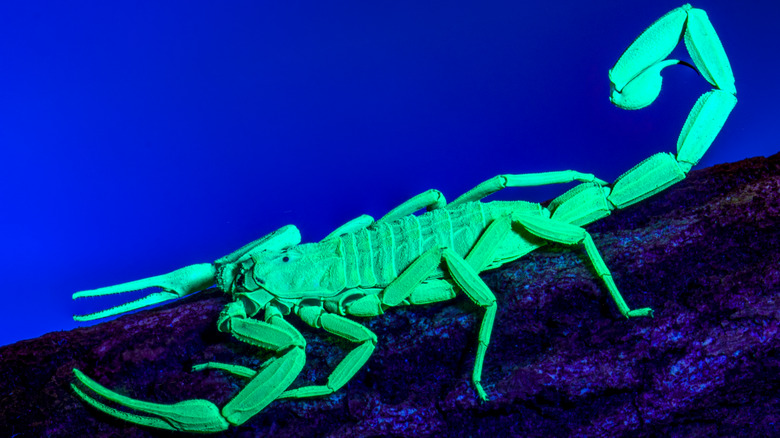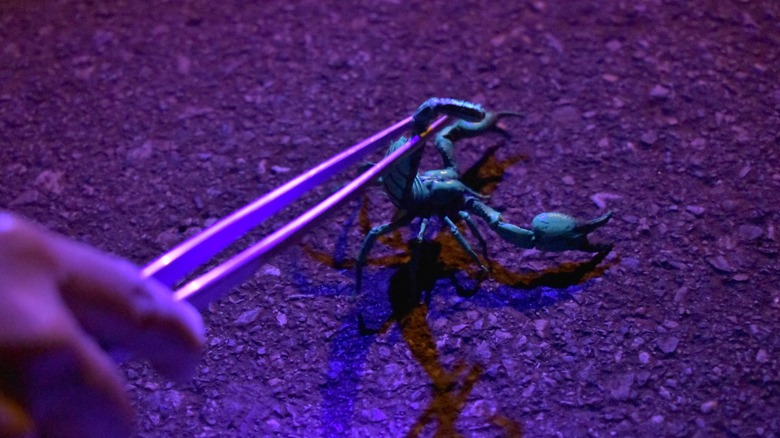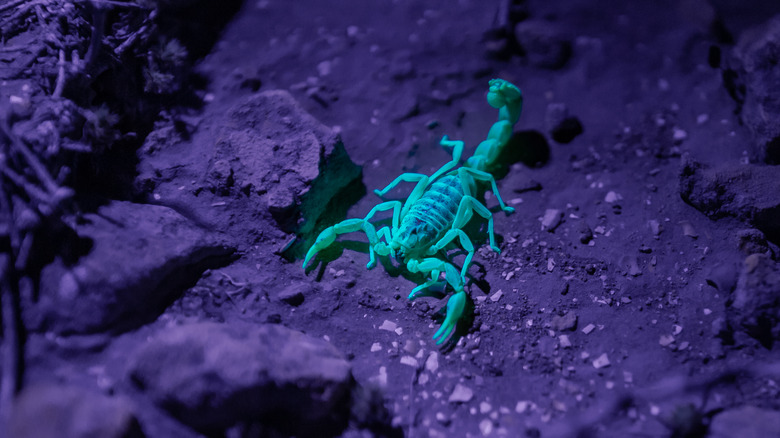The Biggest Theories On Why Scorpions Are Fluorescent
There are a lot of critters in the world that most people would rather avoid for one reason or another. When it comes to scorpions, that reason is usually that people find them frightening. It's not anything new that scorpions can induce fear in people. According to Catholics & Bible, the Bible refers to scorpions as symbols of terror and torment on several occasions.
In reality, scorpions are a part of the arachnid family, much like spiders and ticks. They're incredibly resilient, and researchers have even tested them by freezing them and later watching them thaw out and continue on as if nothing happened, according to National Geographic. These carnivorous critters have a life span of three to eight years and can slow their metabolism so much if needed that one insect is enough to keep them alive for a whole year.
Scorpions have one exceptional trick that sets them apart from so many other creatures. When placed under ultraviolet light, scorpions become fluorescent (per ACS). When under a UV light, scorpions glow a blue or green color, making them look a lot like the glow-in-the-dark stars one might have had in their bedroom as a kid, only a bit more dangerous. While this is an incredible sight and only adds to the scorpion's beauty, there are many theories as to why exactly these arachnids have their vibrant glow.
Theories on the scorpion's glow are still evolving
Scientists aren't sure of the exact reason for the fluorescent glow that scorpions emit when under UV light. However, according to an article published in ACS, some theories include the glow working as a form of sunscreen or as a means for them to find a mate in the dark. Recently, a new idea surfaced when researchers decided to take a closer look at the compounds that make up the scorpion's fascinating, glowing exoskeletons. For many years, only two compounds in the exoskeleton had been identified, β-carboline and 7-hydroxy–4-methylcoumarin.
Researchers worked with the mottled exoskeletons of the liocheles australasiae scorpion, which, according to NTNU, is widely referred to as the "Dwarf Wood Scorpion." The newly discovered compound appears to do the least amount of glowing when it comes to the UV effect. However, it brings to light some strong possibilities as to why it's necessary for scorpions to glow. In the compound sample, researchers identified phthalate ester (via ACS). The National Library of Medicine describes phthalate ester as "one of the most frequently detected persistent organic pollutants in the environment."
Some researchers think that the fluorescence is a form of protection
The finding of phthalate ester opens new doors of possibility when it comes to a reason for the scorpion's mysterious glow. As for other organisms, phthalate ester has had antifungal and antiparasitic properties. Because of this, the possibility of a scorpion's fluorescence being protection against parasites and various infections has become a strong theory amongst researchers, according to ACS.
An article published in Nerdist, referencing a YouTube video on the channel belonging to educator, Derek Muller, explores this theory along with another idea. The theory is that a scorpion's fluorescent glow is simply a trait that no longer has a use as a sunscreen but could be used as a way of detecting UV light to absorb. Watch the full video on the YouTube channel, Veritasium.
Researchers may not come to a definite conclusion on the subject any time soon. However, they have found that the scorpion's fluorescent abilities may be helpful to more than just the scorpions themselves.
The medical world has benefitted from the scorpion's abilities
A 2019 article in Cedars Sinai details the immense benefit of the scorpion's fluorescence on the medical industry. Utilizing a synthesized version of an amino acid found in scorpion venom, neurosurgeons have been able to better see brain tumors during surgery. In the same article, Adam Mamelak, MD, describes just how much this version of the amino acid helps. "With this fluorescence, you see the tumor so much clearer because it lights up like a Christmas tree."
With the tumors being lit up during surgery, surgeons can more easily differentiate between the tumor itself and the patient's unaffected brain tissue, making for an easier time during the removal process. So, while there are many theories regarding the reason behind a scorpion glowing under UV light, scorpions have impacted the world in a highly positive way. This may be something to keep in mind the next time you see (or don't see) these elusive critters, and maybe even a reason to keep a UV light handy, if you live in an area that scorpions frequent.



